
Related
Guests
- Natalie Jacksonattorney for Trayvon Martin’s family. She is the founder of the Women’s Trial Group.
Over a month after 17-year-old Trayvon Martin was shot dead in Sanford, Florida, his gunman George Zimmerman remains a free man despite growing questions over Zimmerman’s claim that he acted in self-defense. A new witness has spoken out saying Zimmerman did not show any signs of injuries after he shot Martin, while another has reportedly alleged police pressured him to change his testimony to match Zimmerman’s story. Meanwhile, Zimmerman’s family has launched a public effort to defend him, while a white supremacist has apparently hacked into Trayvon Martin’s email and Facebook accounts in an effort to tarnish his image. We speak to Natalie Jackson, an attorney for Trayvon Martin’s family. “Clearly, they are trying to protect their family member,” Jackson says of interviews Zimmerman’s relatives have given to the media. “I guess they have a right to do that. But the problem is, they don’t have a right to destroy Trayvon’s memory in the process.” [includes rush transcript]
Transcript
JUAN GONZALEZ: New questions are being raised in the Trayvon Martin case over George Zimmeman’s claim that he shot the 17-year-old in self-defense last month in Sanford, Florida. Speaking anonymously to Anderson Cooper by phone, a witness to the shooting said last night he observed a struggle between Zimmerman and Martin from a nearby window. While Zimmerman told police he was attacked by Martin, the witness said Zimmerman did not show any signs of injures after he shot the teenager. The witness’s voice was distorted to protect his identity.
WITNESS: I can’t say I actually watched him get up. But maybe only within like a couple seconds or so, then he was walking towards where I was watching, and I could see him a little bit clearer, could see that it was a Hispanic man, and he was—you know, he didn’t appear hurt or anything else. He just kind of seemed very—you know, I can’t speak for him, but very worried or whatever, walked like on the sidewalk at that point and his hand up to kind of his forehead. And then another man came out with a flashlight.
AMY GOODMAN: That interview was on CNN. In other developments, the New York Daily News has revealed the mother of a young witness said her son was “pressured” by police. Police have said that 13-year-old Austin Brown saw Zimmerman lying in the grass crying for help just before the slaying, but Brown’s mother says her son only saw one person lying in the grass, and he couldn’t tell who it was because it was too dark. The Daily News is also reporting a former co-worker of Zimmerman says the gunman was fired from his job as an under-the-table security guard for, quote, “being too aggressive.”
Meanwhile, a white supremacist hacker has claimed to have broken into Trayvon Martin’s Gmail, Yahoo!, MySpace and Twitter accounts and posted his private messages online. Some commentators have described it as part of a racist smear campaign against Trayvon Martin.
Meanwhile, members of George Zimmerman’s family have begun speaking to the media. Zimmerman’s father, Robert Zimmerman, appeared on Fox 35 in Florida and explained what he understood to have happened the night Trayvon Martin died.
ROBERT ZIMMERMAN: Trayvon Martin walked up to him, asking, “Do you have a [bleep] problem?” George said, “No, I don’t have a problem,” and started to reach for his cell phone. At that point, he was punched in the nose. His nose was broken, and he was knocked to the concrete.
JUAN GONZALEZ: George Zimmerman’s brother, Robert Zimmerman, Jr., appeared on CNN’s Piers Morgan Tonight. He stood behind his brother’s claim of self-defense even though police surveillance video showed Zimmerman walking into the Sanford police station with no visible signs of blood minutes after he shot and killed Trayvon Martin.
ROBERT ZIMMERMAN, JR.: What I think I see is a swollen nose. Now, I’m not a physician. You’re not a physician. A lot of these injuries take time—24 hours, 36 hours—to show the bruising. Sometimes the bone breaks, and the blood is swallowed, like in the case of, for example, if your hand would be on someone’s nose and mouth preventing them from speaking out.
PIERS MORGAN: Does he have any injuries now?
ROBERT ZIMMERMAN, JR.: His nose is still broken.
PIERS MORGAN: It’s still broken?
ROBERT ZIMMERMAN, JR.: His nose is still broken, yeah.
PIERS MORGAN: A month later, it’s still broken.
ROBERT ZIMMERMAN, JR.: His nose. I don’t know about the back of his head. I mean, his nose is still healing. It’s not healed. He’s not—he has very severe emotional injuries. He has very—he’s been diagnosed with post-traumatic stress disorder.
AMY GOODMAN: While you could see Robert Zimmerman, Jr.’s face on Piers Morgan, when his father went on Fox TV, he was in silhouette.
Well, for more, we go to Orlando, Florida, where we’re joined by Natalie Jackson. She is the attorney for Trayvon Martin’s family, founder of the Women’s Trial Group.
Welcome to Democracy Now! Thank you so much for joining us, Natalie Jackson. Can you respond to these latest stories being presented by George Zimmerman’s father and brother?
NATALIE JACKSON: Clearly, they are trying to protect their family member. And I guess they have a right to do that. But the problem is, they don’t have a right to destroy Trayvon’s memory in the process. Trayvon was an innocent child. There is nothing that he was doing wrong. He was not involved in any criminal activity, and he had a right to be where he was.
My response to them is that, you can tell us whatever you want to, but we have the call that George Zimmerman made, where he said, “These A-holes always get away.” He was told not to get out of his car; he continued to get out of his car. And he also said that Trayvon was running away from him. We also have telephone calls that Trayvon made and prove—telephone records—that he was on the phone when George Zimmerman approached and attacked him. We also have, now, a video that shows that George Zimmerman did not have the injuries that his family members are claiming and that he claimed.
So, it comes to where there is no explanation for people who were not there, such as me and his family members. People who want to know the truth, all they have to do is listen to the video—I mean, listen to the audios and view the videotapes. It’s there for people to see.
JUAN GONZALEZ: And, of course, you have raised serious questions about the initial investigation. And the new police chief there is actually—was part of that investigation?
NATALIE JACKSON: He was a part of that investigation, we’re told. Now, what your audience has to remember is that the family has not been given any information about the investigation into the death of their son. Everything that they are learning is coming from the media. It’s coming from people who are sources, and it’s coming from—it’s coming at the same time that the public is getting it. This is a family who lost their child, their 17-year-old child. And the law enforcement has not released any information to them. That’s why they started this campaign. They want to know what happened when their son was coming home from the store and George Zimmerman got out of his car with a nine-millimeter and shot him dead.
AMY GOODMAN: I want to play more from the eyewitness who spoke to Anderson Cooper on CNN last night. He says he observed the struggle between George Zimmerman and Trayvon Martin from a window. The witness’s voice was distorted to protect the person’s identity.
WITNESS: I couldn’t hear the words, but it was like, OK, this is not a regular conversation. You know, this is someone aggressively, you know, yelling at someone. Saw two men on the ground, one on top of each other, obviously thinking, OK, something really horrible is happening. And at that point, not looking out the window, I heard the yell for help, one yell for help, and then I heard another, as I described this, excruciating type of yell. It didn’t even almost sound like a “Help.” It just sounded so painful. But I wasn’t watching out the window during that. And the next time I looked out the window there, the same thing: two men on the grass, one on top of each other. I kind of thought like they—I couldn’t see a lot of movement, because it was very dark, but I felt like they were scuffling. And then I heard the gunshot, which, to me, were more like pops than they were like a bang.
AMY GOODMAN: Witness that was talking to Anderson Cooper on CNN. Can you—Natalie Jackson, can you talk about the significance of this person coming forward?
NATALIE JACKSON: This person is another witness. You know, there are many witnesses in this case, and there’s a lot of ear evidence and eye evidence that needs to be presented to a jury. I can’t talk about the credibility of this witness nor any other witness, nor George Zimmerman. That is a question for a jury. This case has not—it won’t get to a jury if George Zimmerman is not brought to trial. And that is what happened in this case. When these parents found out that their child had been shot and killed by George Zimmerman, they were told law enforcement could do nothing about it because it was self-defense. That is not the way our system works. That’s not America. He needs to be brought before a jury of his peers. Let them decide who’s credible, who’s not credible, and whether or not he can claim self-defense. There is no doubt who the shooter is. The shooter is George Zimmerman.
JUAN GONZALEZ: Well, it would seem to me also that the forensic evidence, which is bound to come out—it should obviously be presented in a grand jury, but certainly in a trial—would indicate a lot about the proximity of Zimmerman to Martin when the shooting occurred and a lot more in terms of the angles of the bullets. But we have not heard anything about that so far.
NATALIE JACKSON: Yeah, and all of that is for a jury. The point is, is that these parents are told there was not even probable cause to arrest. After we have all of this evidence, these parents—and they were told there was no probable cause to even arrest George Zimmerman. That’s not a satisfactory answer. And it’s especially not a satisfactory answer now that we see all of the evidence that is coming out.
AMY GOODMAN: Natalie Jackson, can you talk about the significance of both the police chief of Sanford stepping aside, though he has said not permanently, as well as the state’s attorney, the person who originally said, after tremendous pressure, after the Justice Department announced an investigation, that they would convene a grand jury in a few weeks, Norm Wolfinger?
NATALIE JACKSON: Well, the significance is, is that now this family feels like they may get some justice for their son. There has been a special prosecutor assigned. This is a prosecutor that is not from the area, does not know the people. And there has been a grand jury convened that is supposed to convene on April 10. The family is feeling more positive. Now, I will say, actions speak louder than words, because this family has heard a lot of words. But they’re feeling more positive that perhaps a fair and equal treatment will be given to this case.
AMY GOODMAN: Can you explain something, Natalie Jackson, that we haven’t seen in the media? First of all, where was Trayvon shot? How was he shot, in what part of his body? And how was it that his family didn’t find out for several days that he was the John Doe in the morgue that had been not—that had not been identified?
NATALIE JACKSON: OK, we haven’t received the autopsy yet, so everything we know about where Trayvon was shot comes from the person who prepared the body. And it was in the center of the chest. The release of the body—the parents knew where Trayvon was the next day, when they filed a missing person’s report. However, he was labeled a John Doe for three days, even after the parents identified [him] as [their] son. That is the problem. So that was a little bit of people not quite understanding what happened.
AMY GOODMAN: Can you explain that?
NATALIE JACKSON: No, we can’t. The parents asked for the release of the body. He was labeled a John Doe. They would not release the body for three days.
JUAN GONZALEZ: So, in other words, they were informed by the next day that he was dead?
NATALIE JACKSON: Yes.
AMY GOODMAN: But was that only after they had filed a missing person’s report?
NATALIE JACKSON: That is correct, after they had filed a missing person’s report.
JUAN GONZALEZ: And what are the next steps for your legal team? And what are you calling for, what you believe has to happen immediately?
NATALIE JACKSON: We believe what has to happen is that we have to continue these media tours to inform the public so that the public will keep the pressure on. There was an online petition to arrest George Zimmerman. That online petition has over two million signatures. This is two million people of all nationalities, all races and all political affiliations, two million people who look at this evidence that is presented and says George Zimmerman needs to be arrested and brought to trial. And as of now, that has not happened. So, until that happens, until he’s brought to trial, then we will continue to put the pressure on.
JUAN GONZALEZ: And you’ve had to hire your own investigators because of the terrible job that has been done so far by authorities in ascertaining the facts in this case?
NATALIE JACKSON: Yes. And, you know, I don’t know if it’s a terrible job or just they thought it was inconsequential to do the job. You know, there’s—whether or not it was important to do or it was bungled, we don’t know. But we had to go out and investigate this case. We hired an investigator that got the phone records. And once we saw Trayvon’s phone record, because he was on the—he had his phone with him, and we saw that he was on the phone when this incident purportedly happened. We contacted the person he was on the phone with. It was a young girl. And she told us that she heard Zimmerman approach Trayvon. And this is very extraordinary, because she and Trayvon—according to the phone records, there was a phone call at 7:12. The phone call lasted for four minutes. That would make it 7:16. According to police records, they were on the scene at 7:17, and Trayvon was dead. So, this young girl is a very important witness.
AMY GOODMAN: And the issue of Trayvon’s life, his reputation being attacked, I mean, his mom saying, “First they kill my son, then they kill his reputation” — what do you know of this white supremacist who supposedly hacked into the—his Twitter account, Facebook, email? What do know about this?
NATALIE JACKSON: We don’t know anything. We know that he’s ignorant, and he’s just as ignorant as the black militia who put out bounties on people. These are ignorant people who are divisive. There is a whole group of people who are united together in justice, and they are united across all races, all nationalities, all political affiliations. We cannot let these people divide and distract from what really happened. This is about the evidence that will be presented, the factual evidence, not everyone’s subjective opinions or their baggage that they’re bringing into this.
AMY GOODMAN: Natalie Jackson, we want to thank you for being with us, local co-counsel for Trayvon Martin’s family. She’s the founder of the Women’s Trial Group. She’s speaking to us from Orlando, Florida, about a half an hour from Sanford, where Trayvon Martin was killed.
This is Democracy Now!, democracynow.org, The War and Peace Report. When we come back, we take a trip through history, look at Trayvon’s Martin case and the story of Emmett Till, 14-year-old African-American boy in Money, Mississippi, who was lynched. We will speak with a woman who was taught by Emmett Till’s mother, Mamie Till Mobley. Stay with us.

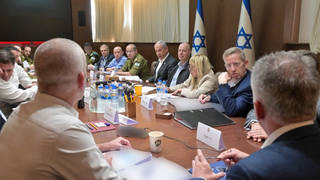
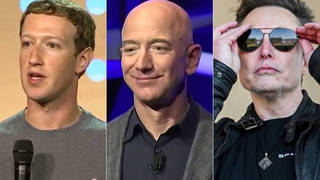
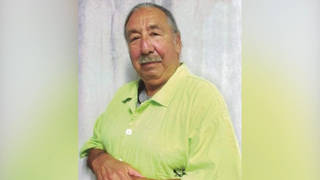
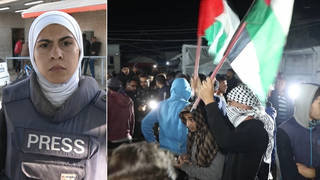






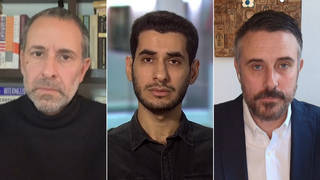
Media Options